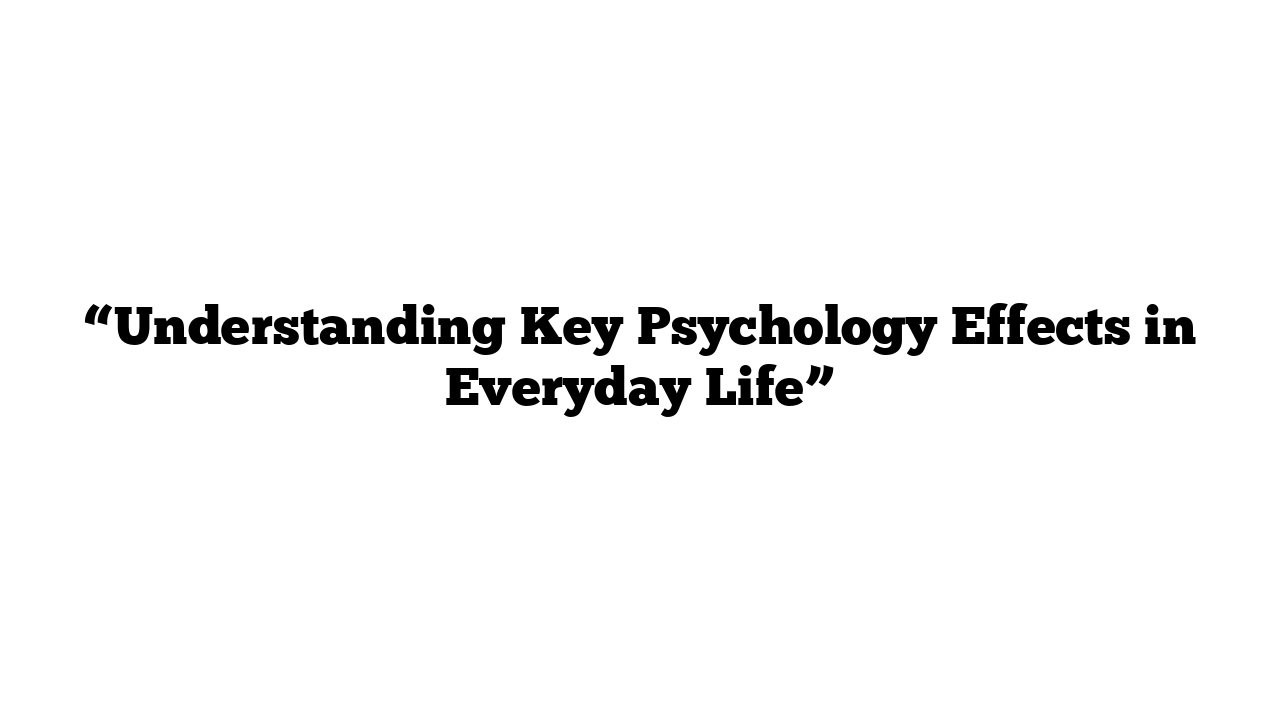Key Psychological Effects That Shape Our Lives
Psychological effects influence our decisions, perceptions, and even our relationships in ways we may not realize. Understanding these concepts can be empowering and give us insight into why we think and act the way we do. Here’s a breakdown of some fascinating psychology effects and how they play out in everyday life.
1. Ambiguity Effect
Ever hesitated to make a decision because the outcome felt uncertain? That’s the ambiguity effect in action. When outcomes are unclear, we tend to avoid making a choice, even if it could benefit us. This effect reveals how uncertainty can hold us back, reminding us to evaluate situations thoughtfully, especially when clarity is lacking.
2. Assembly Bonus Effect
Have you felt more productive in a group? The assembly bonus effect suggests we often see group work as more valuable than individual contributions. People feel motivated in a collective setting, even when not every individual effort is fully recognized. It’s a nod to the value of teamwork and social motivation.
3. Social Facilitation
Do you perform better with an audience? The social facilitation effect describes how the presence of others can enhance our performance on simple tasks, though it may also lead to stress on more complex activities. This effect is why many people thrive in high-energy environments like gyms or performance events.
4. Barnum Effect
Have you ever read a horoscope and thought it was just for you? The Barnum effect explains why we often find vague, general statements personally meaningful. By understanding this effect, we can approach generalizations with caution and recognize when we’re interpreting them too personally.
5. Birthday Number Effect
Do you feel a connection to your birth date? Known as the birthday number effect, this phenomenon highlights our tendency to feel drawn to numbers that represent meaningful personal events. This might influence our decision-making in ways we don’t consciously realize.
6. Name Letter Effect
If you’re particularly fond of the first letter of your name, you’re experiencing the name letter effect. This effect suggests that we naturally prefer letters that appear in our own names, subtly shaping our choices, from career paths to brand loyalties.
7. Boomerang Effect
Ever tried to change someone’s mind and ended up reinforcing their original belief? The boomerang effect occurs when attempts to persuade backfire, often leading individuals to cling more strongly to their initial views. This effect is an interesting example of how communication style can impact beliefs.
8. Bouba-Kiki Effect
Why do rounded shapes seem associated with softer sounds? The Bouba-Kiki effect shows that our brains link certain sounds to visual shapes, associating round shapes with soft sounds and jagged shapes with sharp sounds. This insight explains how language and imagery are interconnected in our minds.
9. Diffusion of Responsibility
In large groups, have you ever felt less responsible to take action? The diffusion of responsibility effect reveals that people tend to assume someone else will step in during critical moments, often leading to inaction. This effect highlights the importance of individual responsibility in group settings.
10. Bystander Effect
Similar to diffusion of responsibility, the bystander effect occurs when people in a group fail to assist someone in need, thinking others will take charge. It’s a reminder of how important it is to act independently rather than waiting for others to respond.
11. Cocktail Party Effect
Ever recognized your name in a noisy room? This phenomenon, known as the cocktail party effect, illustrates our brain’s remarkable ability to pick out personally relevant information from a chaotic environment. This selective attention allows us to focus on what’s meaningful even amid distractions.
12. Contrast Effect
Have you noticed that something seems more appealing when placed next to something less attractive? The contrast effect reveals how our judgments are influenced by comparisons. This effect impacts our perceptions in daily situations, from shopping to making lifestyle choices.
13. Endowment Effect
Do you tend to value things more simply because you own them? The endowment effect explains why people often demand more to give up an item than they’d be willing to pay for it. This effect sheds light on the emotional value we assign to personal possessions.
14. Impostor Syndrome
Have you ever felt like a fraud despite your accomplishments? Impostor syndrome describes the feeling of doubting your success and fearing you’ll be “found out” as an imposter. Understanding this effect can help individuals recognize and counter these unfounded fears.
15. Observer Expectancy Effect
Did you know a researcher’s expectations can influence the results of an experiment? The observer expectancy effect shows that biases can unintentionally affect outcomes, revealing the importance of maintaining objectivity in studies and observations.
In Closing: How Psychology Shapes Our Reality
From the ambiguity effect to impostor syndrome, these psychological effects offer a lens into how we interpret, react, and interact with the world. Understanding these effects can enrich our perspectives, helping us make conscious, informed choices. For more in-depth articles on psychology and mental wellness, visit medicaltimes.io.
